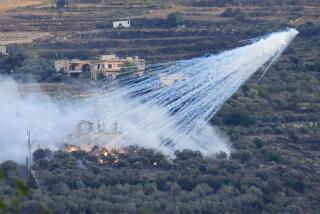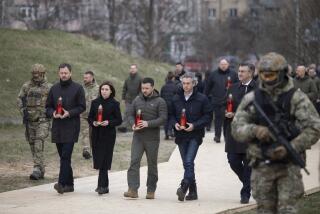Iraq’s Atrocities: More to Come?
- Share via
Last month 65,000 Kurds fled from Iraq into Turkey, the survivors of three days of chemical-weapons attacks on their villages by Iraqi government forces. The State Department quickly concluded that the Kurds, Iraqi citizens whose long quest for independence has made them enemies of the state, had in fact been attacked with poison gas--a weapon outlawed for more than 60 years by international agreement. A new report by investigators for the Senate Foreign Relations Committee supports this earlier finding and adds horrifying details about how the victims of the chemical attacks died. The report notes that the Iraqi Kurds who were able to reach Turkey all came from nearby villages. It raises the chilling possibility that gas attacks against Kurds living in more remote areas may have killed hundreds of thousands.
The Iraqi regime, which long denied but finally admitted that it used chemical weapons against Iran’s army, scoffs at the Kurdish claims and the American accusations. But it also refuses to allow specialists of the United Nations to visit its Kurdish areas to see for themselves. Hard physical evidence to support the charges of chemical warfare is largely lacking. But experts say that the vivid accounts given to Senate investigators by Kurdish refugees in Turkey accurately depict the symptoms associated with mustard-gas poisoning.
The thrust of the Senate investigators’ report is that Iraq has in fact been waging a policy of genocide against its Kurdish minority. The entire Senate had reached a similar conclusion weeks ago. It has already voted sanctions that would block U.S. trade with Iraq, including oil imports, and forbid loans or loan guarantees until the President certifies that Iraq has stopped using chemical weapons. The House is expected to act soon on the matter.
A unilateral U.S. response, though, is no substitute for a concerted international position that not only would repeat that using chemical weapons is utterly unacceptable but also would support that ban with the threat of political and economic retaliation. A tough approach is needed because chemical and biological weapons are spreading rapidly and are now part of the arsenals of such countries as Libya, Syria and Iran--states whose leaders, like those of Iraq, have few moral inhibitions concerning the mass killing of real or imagined enemies, foreign or domestic. Iraq committed its atrocities against the Kurds in full expectation that the world would soon forget. If it is right in that estimate, other atrocities involving the use of chemical weapons seem certain to follow.
More to Read
Sign up for Essential California
The most important California stories and recommendations in your inbox every morning.
You may occasionally receive promotional content from the Los Angeles Times.












